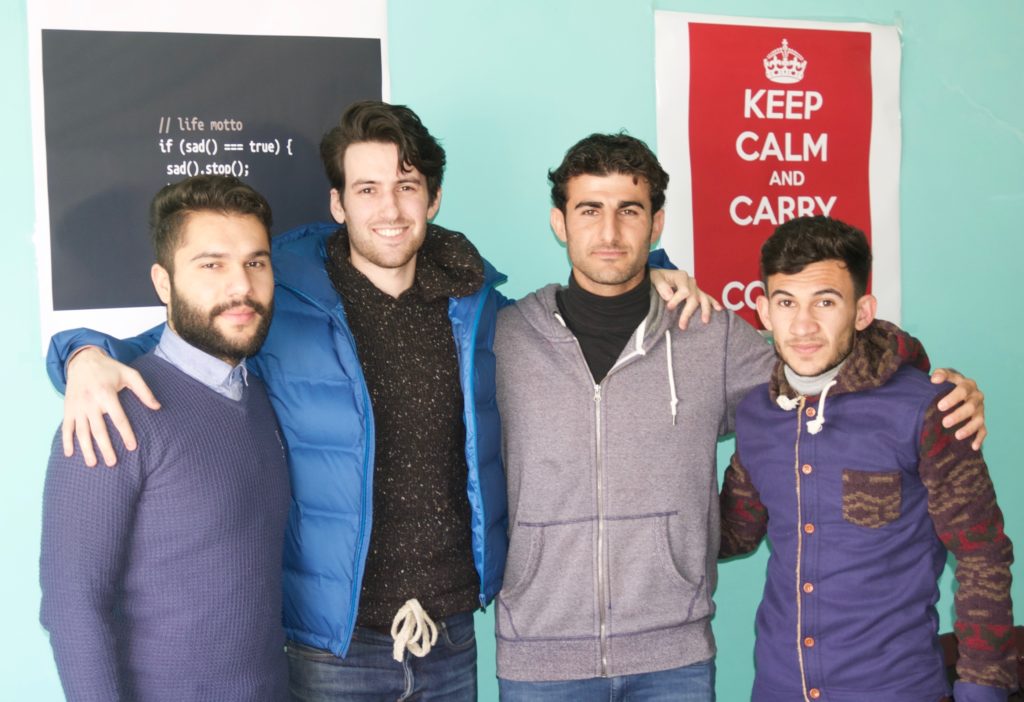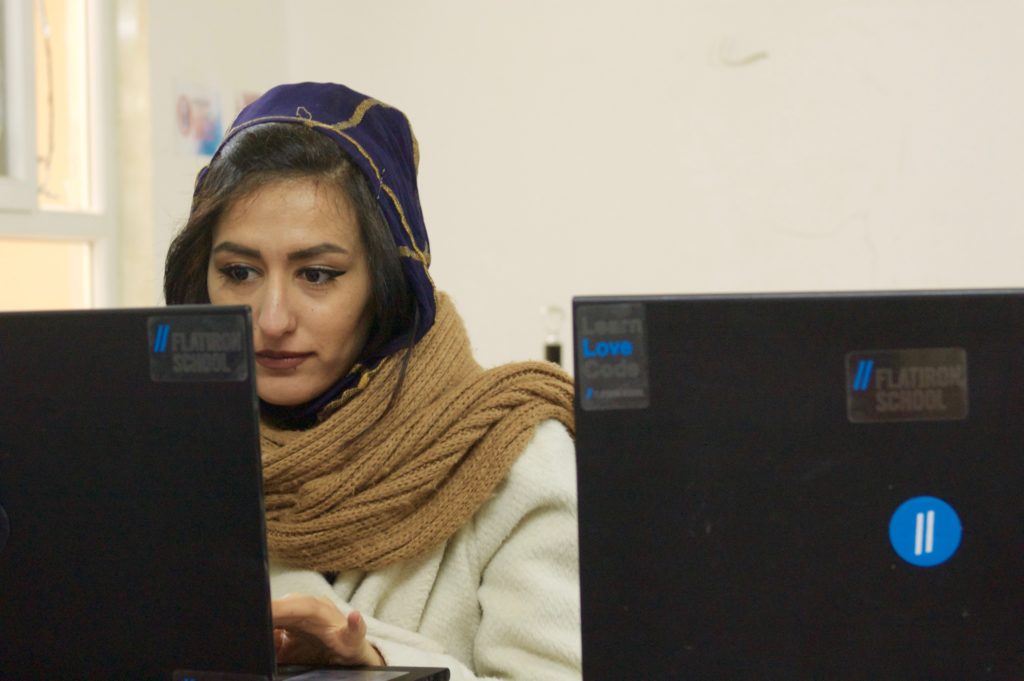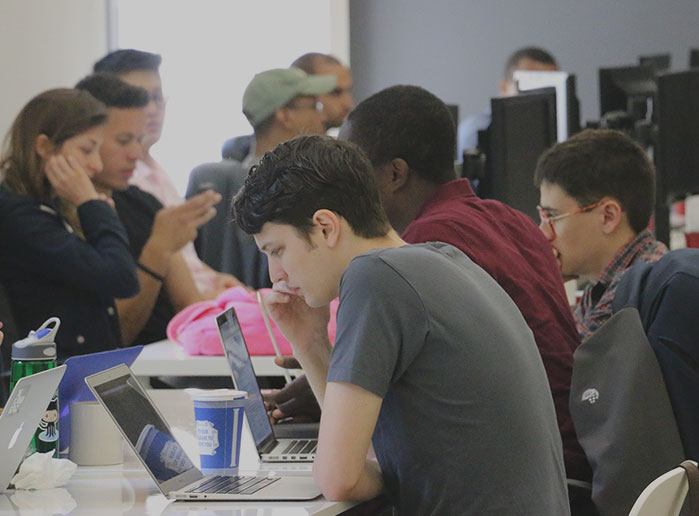When we last caught up with Gabe Jackson, an alum of our Online Web Developer Program, he was getting close to finishing the course, supplementing his studies by diving into the music coding tool Sonic Pi. Since then he’s taken an incredible step in his career, joining Flatiron partner Re:Coded in Iraq to help refugees – Syrians and internally-displaces Iraqis – learn to code and get jobs as software engineers. We couldn’t be more proud of Gabe and are happy to share our recent conversation about his experience teaching code to refugees.
So when we last talked, you were in the middle of the Online Web Developer Program. Congrats on graduating! How was the rest of that experience for you? Any reflections now that you’re done?
Thanks! Finishing the program brought a great sense of accomplishment that lasted about 35 seconds before I jumped back into studying new things. As far as reflections, I really blitzed through the last stretch of the curriculum. I wish I’d gone through it at a more normal pace and allowed myself the freedom to take deeper, extracurricular dives into some of the concepts I was learning. I think it would’ve been even more helpful to take those detours in the moment instead of circling back a few weeks later to try to remember why I’d bookmarked a certain resource or how it fit in with everything else.
What inspired you to join Re:Coded? Did you know right away that you wanted to teach instead of going out for a software engineering role?
I definitely didn’t imagine that I would immediately jump into teaching, but I couldn’t pass this up. When Rebekah (shout out for being awesome) told me about Re:Coded, my initial reaction was probably something like, “Hey, I’m not sure you noticed, but the listing says the position is based in IRAQ!” But the more I thought about it, the more I viewed it as an incredible opportunity to have a meaningful impact on the students’ lives.
My initial reaction was probably something like, “Hey, I’m not sure you noticed, but the listing says the position is based in IRAQ!” But the more I thought about it, the more I viewed it as an incredible opportunity to have a meaningful impact on the students’ lives.
I felt pretty uniquely qualified, too, given that I had just completed the same curriculum the Re:Coded students were working through, I had prior experience tutoring non-native speakers, and a bunch of the students tuned in for one of my Sonic Pi webinars and were super enthusiastic about it. When I heard that they loved the lecture and were posting Sonic Pi creations on the Facebook group wall, I thought, “Welp, guess I’m going to Iraq.”
Can you share a bit about your experience with Re:Coded so far? What’s an average day for you?

Gabe at Re:Coded HQ in Erbil.
This has unequivocally been the best job I’ve ever had. My students are smart, vibrant, hilarious, inspiring, determined, kind, resilient, patient, and just generally cool human beings. I have an amazing co-instructor, Shereen, and great bosses. Shereen and I co-teach two sections every day, in the morning from 9:00 to 12:30 and then in the afternoon from 1:00 to 4:30. We alternate lecturing about new concepts, walking through the previous night’s homework, doing group examples with the entire class, and walking around giving individual, one-on-one support. When I’m at home, I’m never too far from my computer so that I can field student questions. They all have very different schedules at home, so it’s a bit of a challenge. But if a student arrives home at 7:00, has to care for their family (sometimes including a large extended family), can’t start studying until midnight, and has a question for me, I want to be there to answer it. It’s probably not a viable work-life balance in the long run, but for now there’s nothing that could make me happier.
How does it feel to share what you learned in such an impactful way – with those who could really benefit from this kind of career?
It’s indescribable. I wake up every day excited to get to class. I’m a huge proponent of coding education in general, but it represents a true grail for displaced populations. Software development is a uniquely portable craft, and the material barriers to entry are falling dramatically – laptops get more portable and less expensive every year, and a number of actors (some admittedly driven by questionable moral principles) are racing to blanket the globe with free satellite Internet. The livelihood prospects inside of refugee camps fall somewhere on the scale between inadequate and non-existent, and it’s little better for displaced peoples outside of a camp, who must compete for jobs in a local economy that doesn’t often welcome them with open arms. Obviously the optimal situation would be one in which the displacing event could be avoided altogether. But, accepting that as fantasy, a more realistic measure is to equip displaced populations with a portable skill set they can leverage in a refugee camp (where the average stay lasts about 17 years) and also in their home country (if they are able to return) or a third location (if they are not). The work isn’t tethered to a physical space, such as a factory, office, or farm, and it returns some small measure of control over their own lives to people who sacrifice a ton upon fleeing their homes. Feeling like I have even the smallest hand in that empowerment is beyond gratifying.

A Re:Coded fellow hard at work.
What’s the most important thing you learned at Flatiron School that you’re now leveraging in your teaching?
The most important thing I try to pass on to my students is a confidence in their ability to continue teaching themselves new things after the program ends. I think the Flatiron curriculum strikes a good balance of, in the beginning, providing students with all of the necessary information to build a solid, foundational understanding and, in later sections, increasingly encouraging students to supplement their Flatiron lessons with extracurricular material. I love that software development doesn’t subscribe to notions of mastery or finality – that there are always new technologies to learn and new updates to keep abreast of. The upshot is that a voracious appetite for learning is the single best skill a developer can possess, but it’s sometimes difficult to convince students that they’ll be able to succeed on their own once the training wheels are removed. The best way I’ve found is to enthusiastically acknowledge when I don’t know something and turn it into a teachable moment. Saying “I don’t know” is perfectly fine as long as you know how to fill that knowledge gap, and I think it’s refreshing and heartening for the students to see that even their teachers look things up. I want to instill in them the confidence to find any information they need through sources consistently tapped by developers of all levels – Google, StackOverflow, API documentation, and the like.
[bctt tweet=”‘The upshot is that a voracious appetite for learning is the best skill a developer can have'” username=”flatironschool”]Thanks so much for taking the time to catch up with us. One quick bonus question: for your fans out there, are you still doing Sonic Pi?
Unfortunately I haven’t had any time to mess around with Sonic Pi since arriving here, but it sounds like Avi’s been picking up the slack!
Read more about Re:Coded here.
Written byJOSH HIRSHFELD
Content Marketing Manager, Flatiron School

